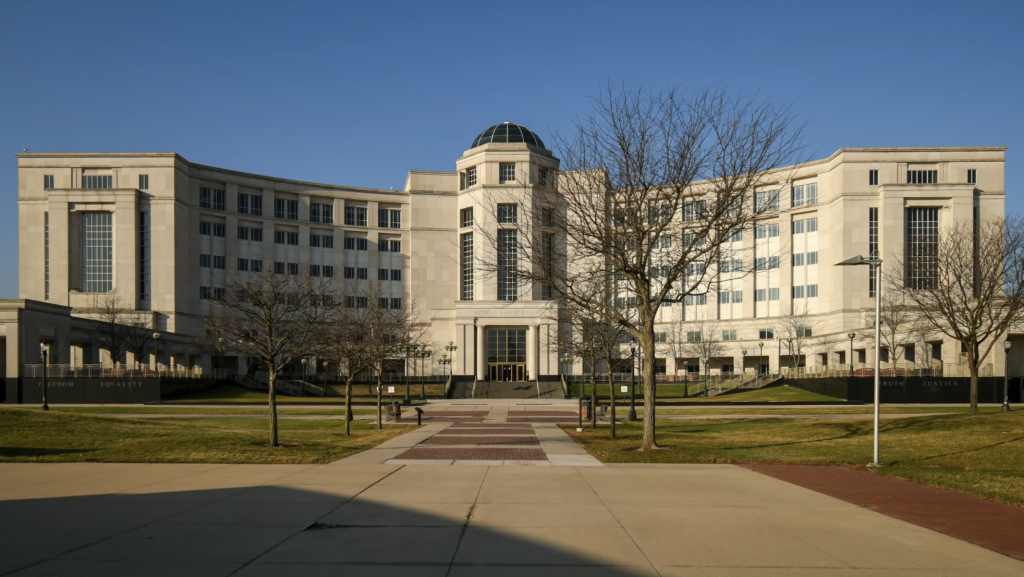Michigan Supreme Court sides with state in COVID-19 shutdown cases
Colin Jackson September 3, 2024The initial lawsuits argued the state owed businesses money for revenue they lost because of the state’s emergency health orders.

The Michigan Hall of Justice.
The Michigan Supreme Court declined to take up a group of cases involving the state’s COVID-19 shutdown orders Friday.
That choice left in place appellate court rulings that dismissed the three lawsuits.
One case concerned a gym forced to close for six months during the pandemic, while another was brought by several restaurants that faced closures or severe restrictions.
In both cases, the plaintiffs made an argument around the principle of “taking.” That legal term describes when the government seizes or prevents the use of private property.
Both the U.S. Constitution and Michigan Constitution include clauses requiring compensation for when that occurs.
The lawsuits argued the state owed businesses money for revenue they lost because of the state’s emergency health orders.
Lawyer Albert Addis represented Macomb County restaurants in the lawsuits. He said the shutdowns were akin to the government taking someone’s property.
“What we seem to have forgotten in Michigan is, you want to take it, you’ve got to pay us for it. You don’t get to just take it. You don’t get to take my business without compensating me. To me, it’s one of the most simple American rules of justice,” Addis said.
But the Michigan Court of Appeals disagreed and upheld the Court of Claims’ dismissal of the lawsuit. It noted the trial court applied a test based on the 1978 federal Penn Central Transportation Co. v New York City case.
In initially hearing the case, the Court of Claims found the shutdown did heave a negative economic impact on the businesses and interfered “with reasonable investment-backed expectations.”
But it also ruled that the “economic impact and the interference with business expectations arising from the closure orders were short lived.”
And the court said another factor — the way the state used executive orders to respond to the pandemic threat — “was compelling in that the aim of the EOs was to stop the spread of COVID-19.”
In January, the Michigan Supreme Court heard arguments about whether it should take up the appeal.
Two members of the court, Justice David Viviano and Richard Bernstein, dissented in Friday’s decision not to.
“By looking the other way on claims like these, we ‘damage the credibility of the judiciary to serve as a bulwark of our liberty and ensure that the government does not take private property without just compensation—even in times of crisis,’” the dissent wrote.
Addis said he would need time to check in with his clients in the case but that he’s leaning toward advising them to appeal the case to the U.S. Supreme Court as a next step.
Separately, the state Supreme Court also chose not to hear a case regarding refunds for pandemic-related learning interruptions at some of the state’s public universities.
Again, the Michigan Court of Appeals let stand a trial court decision to dismiss the case.
Kate Bergel is the director of human resources, safety & risk, and Title IX coordinator with Lake Superior State University, one of the schools being sued.
Bergel said LSSU did its best to be flexible during the early pandemic.
“Lake State did what we had to do in order to still deliver the educational content that we promised. It didn’t happen in person but we still did the best that we could under the rules that we’re required to follow by the state guidelines,” Bergel said.
The lawsuit, which also targeted Central Michigan University and Eastern Michigan University, argued the schools had broken their contractual obligations in shifting classes online, and in the case of CMU and EMU, limiting access to residence halls.
The court of appeals found language in each of the universities’ student agreements made exceptions for extreme circumstances.
Trusted, accurate, up-to-date.
WDET strives to make our journalism accessible to everyone. As a public media institution, we maintain our journalistic integrity through independent support from readers like you. If you value WDET as your source of news, music and conversation, please make a gift today.
